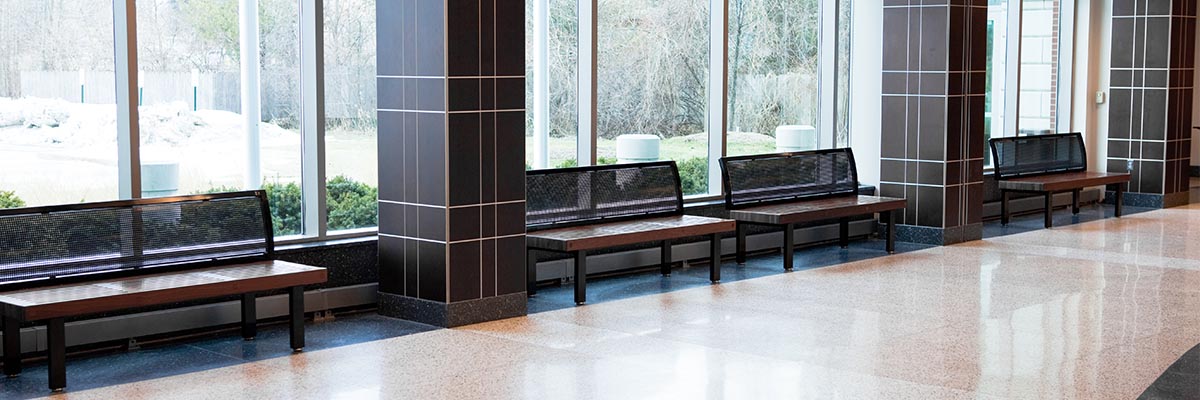Winter Floor Care: Proactive Steps for a Clean and Damage-Free Season
As winter approaches, planning ahead and taking proactive steps to ensure clean and damage-free floors is crucial. Implementing a comprehensive cleaning program during the winter months is important to maintain the integrity and appearance of your floors.

In this article, we'll look at additional measures you can take to protect your facility this winter. Taking these proactive steps will not only enhance the appearance of your facility but will also extend the lifespan of your floors, saving you time and money in the long run.
Take Advantage of Entry Matting To Protect the Building's Floors
Entry matting is the first line of defense in preventing dirt, dust, moisture, and other substances from being tracked into the building. This protective measure can greatly reduce the amount of debris introduced to the interior space, minimizing the need for constant floor cleaning.
Proper Placement and Maintenance
To maximize the effectiveness of entry matting, facility managers should ensure that mats are strategically placed at all entrances and high-traffic areas throughout the building. This includes the main entrance and secondary entrances, lobbies, corridors, and elevators. Regular maintenance of the mats is crucial to ensure their optimal performance. This includes regular vacuuming, spot cleaning, and periodic deep cleaning to remove accumulated dirt and moisture.
For additional reading on entry matting, see this article: Entry Matting: Trapping dirt to lower the total cost to clean
Use a Wet Vacuum or Extractor to Clean Entry Matting
Entry matting plays a vital role in trapping dirt, moisture, and debris from foot traffic, preventing them from spreading throughout the building. Regular cleaning of entry matting is essential to ensure its functionality and prevent slip and fall accidents.
A wet vacuum or carpet extractor is highly recommended to effectively clean entry matting. During winter, using an ice melt neutralizer will help you remove the unsightly white left behind after the matting dries.
Using Ice Melt Neutralizer on Entry Matting
To ensure that entry matting remains clean and in good condition, facility managers should consider using an ice melt neutralizer. This simple and effective solution helps neutralize and remove the white powdery residue left by ice melt.
The process for neutralizing the residue is straightforward. Prepare a cleaning solution by mixing the ice melt neutralizer with water according to the manufacturer's instructions. Apply the solution to the entry matting using a sprayer or a mop, and allow it to sit for five minutes. Finally, use a scrub brush and wet/dry vacuum or a carpet extractor to agitate the solution and remove the residue. Rinse the mats thoroughly with water and allow them to air dry.

Tips for Hard Floors
Scrub and Recoat Floors Before Winter
As facility managers gear up for the winter season, one essential step in this process is scrubbing and recoating the floors. Scrubbing and recoating the floors before winter is an effective way to safeguard them from potential damage.
This process involves deep cleaning the floor surface and applying a fresh coat of high-quality floor finish The floor finish acts as a protective layer, shielding the floor from scratches, stains, and wear caused by heavy foot traffic and winter-related elements.
Not only does scrubbing and recoating before winter protect the floors, but it also has other benefits. It enhances the facility's overall appearance, creating a clean and welcoming environment for employees and visitors alike.
For a deeper look at the products and processes used to scrub and recoat a floor, see this page: Revitalize Finished Floors.
Use Floor Neutralizer to Remove Ice Melt Residue
One common issue during the winter months is the accumulation of ice melt residue tracked throughout the entry area and main walkways. Fortunately, this can be effectively addressed by using a floor neutralizer like Nutra-Rinse.
For resilient flooring, sweep the area to remove loose debris. Next, dilute Nutra-Rinse at 4 oz./gallon. Damp mop the floor and allow the solution to dry. If needed, scrub or mop the floor after the Nutra-Rinse solution has dried.
Clean out Automatic Scrubbers Tanks to Remove Salt Residue
One common challenge arises when dealing with salt residue in automatic scrubber tanks. Salt residue can build up over time, leading to potential equipment damage and inefficient cleaning. To ensure an effective cleaning program, it is essential to follow these steps to clean out the automatic scrubber's tanks and remove salt residue.
To remove salt residue:
- The first step is to empty the tank completely. It is important to dispose of any leftover water or cleaning solution properly. Once emptied, rinse the tank thoroughly with clean water. This helps remove any loose salt particles and residual cleaning chemicals.
- After rinsing, letting the tank air dry completely is crucial. This helps eliminate any moisture that might still be present, preventing the growth of mold or bacteria. Leaving the tank in a dry and well-ventilated area is advisable to speed up the drying process.
Tips for Carpet
Use Air Movers near Entrances
Carpeted floors can take a beating in the wintertime, especially near entrances where snow and ice are tracked in. To help keep carpets clean and dry, consider using an air mover
or blower near entrances. Air movers help quickly dry carpets after they have been cleaned or after wet weather comes through. This prevents moisture from setting in and causing deep stains or odors. Additionally, air movers also reduce drying times, allowing carpets to be vacuumed more frequently. When choosing an air mover, it's important to select one powerful enough for larger areas but quiet enough for sensitive settings such as hospitals and schools.
Vacuum More Frequently
During the winter months, facility managers face the challenge of managing the increased amount of soil brought in through the doors. With snow and ice, comes the need for regular maintenance to combat the sand and salt particles that can damage carpet fibers. The constant traffic of people entering and exiting the facility causes sand and salt particles to be tracked onto the carpets. These abrasive soils can cut into the carpet fibers over time if not removed promptly. To keep your floors in top condition, increasing the frequency of vacuuming during the winter is crucial.
Use Ice Melt Neutralizer on Carpets
Eliminate hazy ice melt residue with an ice melt neutralizer, like Nutra-Rinse. Dilute the neutralizer at 4oz./gallon in a pump-up sprayer. Spray the carpet where the ice melt has been tracked in. Allow the carpet to dry, and then vacuum.
Have a Plan for Snowy Days
As a facility manager, it's crucial to be prepared for all types of weather conditions, including snowy days. Snow can not only create hazards for building occupants but also increase the challenge of cleanliness and maintenance. Therefore, it's essential to have a well-thought-out plan to navigate the winter season effectively.
One crucial aspect of this plan is to ensure you have extra labor available on snowy days. Snowfall can lead to increased dirt, water, and salt being tracked into the building, making entryway maintenance a priority. With additional cleaning staff, you can promptly address any messes and prevent them from spreading throughout the facility.
Furthermore, equip your staff with the necessary tools and supplies for entryway maintenance during snowy days. This includes snow shovels, salt spreaders, wet floor signs, and extra mats to absorb moisture and dirt. Regularly monitor and refill these supplies to maintain a high level of cleanliness in entryways.
By having a well-prepared plan for snowy days, facility managers can maintain the cleanliness and safety of their buildings, providing a better experience for occupants and visitors alike.
Hillyard Can Help You Protect Your Floors Throughout the Winter
During the winter months, harsh weather conditions can significantly threaten the longevity and appearance of your facility's flooring. Thankfully, Hillyard is here to offer solutions that will help you protect your floors and ensure their durability throughout the winter.
One of the key ways Hillyard can assist you is through our top-quality floor finish and protective coatings. These products create a durable barrier between your floors and the elements. Whether it's snow, salt, or dirt, Hillyard's floor finish and protective coating will prevent these substances from seeping into your floors, causing potential damage.
Additionally, Hillyard understands the importance of an effective entrance mat system. That's why they provide scraper-wiper entrance mats designed to capture and hold dirt, moisture, and debris before they get tracked onto your floors. Investing in these mats can significantly reduce the dirt and moisture that enters your facility, ultimately minimizing the wear and tear on your floors.
Use the "I'm Interested" form below to contact us. One of our expert representatives will get in touch with you to help you build your winter cleaning program.